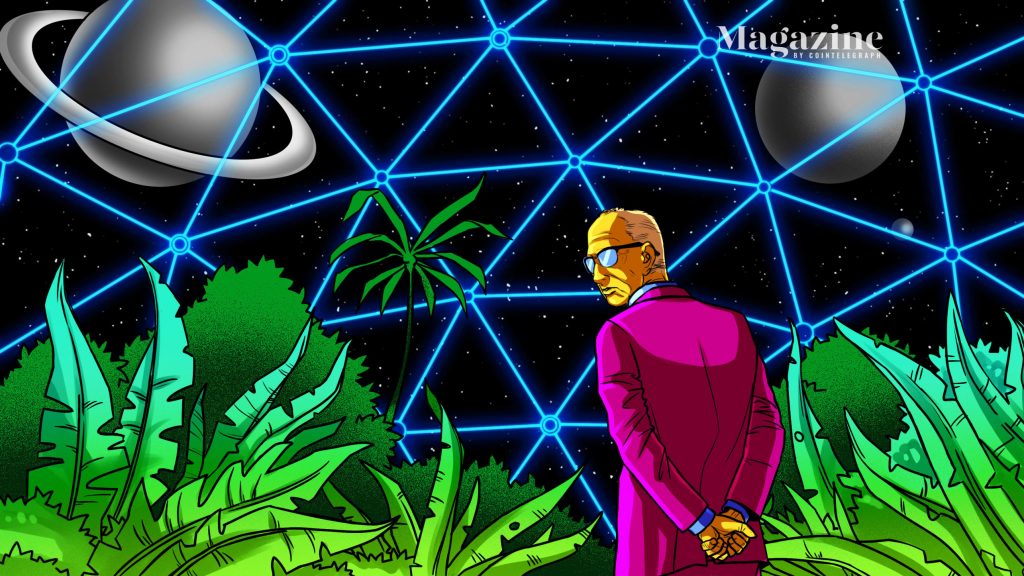## The Scientific Revolution 2.0 is Here, and It’s Decentralized.
Forget dusty labs and ivory towers. The future of science is open, collaborative, and powered by blockchain.
Cointelegraph’s latest article dives deep into the exciting world of Decentralized Science (DeSci) and its explosive potential to disrupt the traditional scientific landscape. We’re talking about a paradigm shift where AI, fueled by open-source data and community-driven research, is poised to rewrite the rules.
Accelerated Research and Development

Decentralized science, powered by blockchain technology, promises to revolutionize research and development (R&D) by fostering collaboration, transparency, and efficiency. By removing traditional barriers to access and incentivizing participation, this paradigm shift can accelerate the pace of scientific discovery and innovation.
One of the key advantages of decentralized science is the ability to tap into a global pool of talent and expertise. Researchers from diverse backgrounds and institutions can collaborate on projects in a secure and transparent manner, regardless of geographical location or institutional affiliations. This open and inclusive approach can lead to more innovative solutions and faster progress in tackling complex scientific challenges.
Blockchain technology also enhances transparency and accountability in R&D by providing an immutable record of data and contributions. Every step of the research process, from data collection to analysis and publication, can be documented and verified on the blockchain, ensuring the integrity and reproducibility of scientific findings. This level of transparency can foster trust and collaboration among researchers, while also reducing the risk of fraud or plagiarism.

Enhanced Transparency and Accountability
In traditional scientific research, data sharing and publication can be hampered by institutional silos, intellectual property concerns, and a lack of standardized protocols. Decentralized science addresses these challenges by creating a platform for open and accessible data sharing. Research data, code, and publications can be stored on the blockchain, ensuring their permanence and immutability. This open access to data can accelerate scientific progress by enabling researchers to build upon each other’s work and accelerate the pace of discovery.
Furthermore, decentralized science promotes accountability by providing a transparent audit trail of all research activities. Every contribution, review, and decision can be tracked and verified on the blockchain, reducing the potential for bias or misconduct. This enhanced accountability can strengthen the integrity of scientific research and build trust in the scientific community.
Empowering Citizen Scientists and Community Engagement
Decentralized science has the potential to democratize scientific research by empowering citizen scientists and fostering community engagement. Individuals without formal scientific training can contribute to research projects by collecting data, analyzing results, or providing feedback. This participatory approach can broaden the scope of scientific inquiry and tap into the collective intelligence of the global community.
Blockchain technology can facilitate this citizen science movement by providing a platform for secure data sharing, collaboration, and recognition of contributions. Citizen scientists can earn rewards for their contributions, incentivizing their participation and fostering a sense of ownership and responsibility in the research process.
Real-World Applications: Case Studies in Decentralized AI
Healthcare: Drug Discovery and Personalized Medicine
Decentralized AI is transforming healthcare by accelerating drug discovery, enabling personalized medicine, and improving patient outcomes. Blockchain technology can secure and share patient data in a privacy-preserving manner, enabling researchers to analyze large datasets and identify new drug targets. This open access to data can accelerate the development of new therapies for diseases such as cancer, Alzheimer’s, and HIV.
Furthermore, decentralized AI can empower patients by providing them with access to personalized medical advice and treatment recommendations. By analyzing a patient’s individual genetic makeup, medical history, and lifestyle factors, AI algorithms can generate personalized treatment plans that are tailored to their specific needs.
Environmental Science: Climate Modeling and Conservation Efforts
Decentralized AI is playing a crucial role in addressing environmental challenges by improving climate modeling, monitoring deforestation, and protecting endangered species. Blockchain technology can securely store and share environmental data from various sources, such as satellites, sensors, and citizen scientists. This data can be used to create more accurate climate models and track the impact of human activities on the environment.
Moreover, decentralized AI can empower conservation efforts by providing real-time monitoring of endangered species, detecting illegal logging activities, and identifying areas for habitat restoration. By leveraging the power of AI and blockchain, we can work towards a more sustainable future.
Social Good: Addressing Global Challenges Through Open Innovation
Decentralized AI has the potential to address global challenges such as poverty, hunger, and access to education by fostering open innovation and empowering communities. Blockchain technology can facilitate the development of decentralized applications (dApps) that provide access to essential services, such as microfinance, healthcare, and education, in underserved areas.
By leveraging the power of AI and blockchain, we can create a more inclusive and equitable world where everyone has the opportunity to thrive.
Building the Bridge: Fostering Collaboration Between Worlds
The Role of Educational Initiatives and Skill Development
To fully realize the potential of decentralized science and AI, it is essential to invest in educational initiatives that equip individuals with the necessary skills and knowledge. Educational programs should focus on teaching the fundamentals of blockchain technology, AI algorithms, and data science principles. By fostering a skilled workforce, we can accelerate the adoption and development of decentralized solutions.
Furthermore, it is crucial to promote interdisciplinary collaboration between computer scientists, domain experts, and social scientists. These collaborations can lead to the development of more comprehensive and impactful solutions that address the complex challenges facing humanity.
Establishing Open-Source Platforms and Collaborative Networks
Open-source platforms and collaborative networks are essential for fostering the growth and development of decentralized science and AI. By making code, data, and tools freely available, we can accelerate innovation and encourage wider participation. Open-source projects can serve as incubators for new ideas, allowing researchers and developers to collaborate and build upon each other’s work.
Collaborative networks can connect researchers, developers, and policymakers from around the world, creating a vibrant ecosystem for decentralized science and AI. These networks can facilitate knowledge sharing, resource allocation, and the development of best practices.
Advocating for Policy Changes that Support Decentralized Innovation
Governments and policymakers have a crucial role to play in supporting the development and adoption of decentralized science and AI. By enacting policies that promote open access to data, encourage collaboration, and provide regulatory clarity, governments can create a favorable environment for innovation.
It is also important to address concerns surrounding the ethical implications of decentralized AI, such as bias, fairness, and accountability. Policymakers should work with researchers and industry stakeholders to develop ethical guidelines and frameworks that ensure the responsible development and deployment of AI technologies.
Conclusion
The convergence of decentralized science and artificial intelligence is undeniably a game-changer, one that threatens to disrupt the very foundations of traditional scientific research. As Cointelegraph highlights, legacy institutions, steeped in hierarchical structures and centralized control, are ill-equipped to navigate this paradigm shift. The open, collaborative, and transparent nature of decentralized science, coupled with the unparalleled processing power of AI, presents a formidable challenge to the established order. This isn’t just about technology; it’s about a fundamental shift in how we approach knowledge creation and dissemination. The potential for democratized access to scientific breakthroughs, accelerated research cycles, and unprecedented innovation is immense. However, the path forward will require a willingness to embrace change, to dismantle outdated structures, and to foster a culture of collaboration and transparency. The institutions that fail to adapt risk being left behind in this new era of scientific discovery. The future of science belongs to those who dare to break the mold, who embrace the power of decentralization, and who harness the transformative potential of AI. Will you be part of this revolution?
